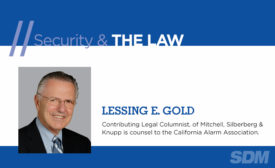Articles by Lessing E. Gold
Security & the Law
Columnist Les Gold says even inmates in Sing Sing have rights.
Read More
Security & the Law
Be Careful With Bankruptcy
Columnist Les Gold warns readers to be careful with filing for bankruptcy.
June 1, 2020
Security & the Law
Who Has Jurisdiction?
In this case, does the state or federal court have jurisdiction?
May 4, 2020
Security & the Law
Was a Security Alarm Company Negligent in Fire Death?
MONITORING CONTRACTS
April 6, 2020
Security & the Law
Is County Required to Pay False Alarm Late Fines?
FALSE ALARMS
March 2, 2020
Security & the Law
What Constitutes Confidential Information?
PRELIMINARY INJUNCTION
February 3, 2020
Security & the Law
Is Alarm Company Responsible for Plaintiff’s Flood Damage?
December 3, 2019
Security & The Law
Does Monitoring Contract With Tenants Entitle Building Insurance Provider to Reimbursement?
INSURANCE LAWSUIT
October 7, 2019
Be in the forefront of security intelligence when you receive SDM.
Join over 10,000+ professionals when you subscribe today.
SIGN UP TODAY!Copyright ©2024. All Rights Reserved BNP Media.
Design, CMS, Hosting & Web Development :: ePublishing

